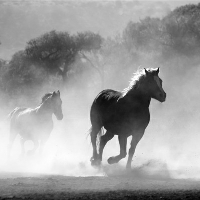THE FARM-YARD COCK AND THE WEATH
there were two cocks- one on the dung-hill, the other on
the roof. they were both arrogant1, but which of the two
rendered most service? tell us your opinion- we'll keep to
ours just the same though.
the poultry2 yard was spanided by some planks3 from another
yard in which there was a dung-hill, and on the dung-hill lay
and grew a large cucumber which was conscious of being a
hot-bed plant.
"one is born to that," said the cucumber to itself. "not
all can be born cucumbers; there must be other things, too.
the hens, the ducks, and all the animals in the next yard are
creatures too. now i have a great opinion of the yard cock on
the plank4; he is certainly of much more importance than the
weather-cock who is placed so high and can't even creak, much
less crow. the latter has neither hens nor chicks, and only
thinks of himself and perspires5 verdigris6. no, the yard cock
is really a cock! his step is a dance! his crowing is music,
and wherever he goes one knows what a trumpeter is like! if he
would only come in here! even if he ate me up stump7, stalk,
and all, and i had to dissolve in his body, it would be a
happy death," said the cucumber.
in the night there was a terrible storm. the hens, chicks,
and even the cock sought shelter; the wind tore down the
planks between the two yards with a crash; the tiles came
tumbling down, but the weather-cock sat firm. he did not even
turn round, for he could not; and yet he was young and freshly
cast, but prudent8 and sedate9. he had been born old, and did
not at all resemble the birds flying in the air- the sparrows,
and the swallows; no, he despised them, these mean little
piping birds, these common whistlers. he admitted that the
pigeons, large and white and shining like mother-o'-pearl,
looked like a kind of weather-cock; but they were fat and
stupid, and all their thoughts and endeavours were directed to
filling themselves with food, and besides, they were tiresome
things to converse10 with. the birds of passage had also paid
the weather-cock a visit and told him of foreign countries, of
airy caravans11 and robber stories that made one's hair stand on
end. all this was new and interesting; that is, for the first
time, but afterwards, as the weather-cock found out, they
repeated themselves and always told the same stories, and
that's very tedious, and there was no one with whom one could
associate, for one and all were stale and small-minded.
"the world is no good!" he said. "everything in it is so
stupid."
the weather-cock was puffed12 up, and that quality would
have made him interesting in the eyes of the cucumber if it
had known it, but it had eyes only for the yard cock, who was
now in the yard with it.
the wind had blown the planks, but the storm was over.
"what do you think of that crowing?" said the yard cock to
the hens and chickens. "it was a little rough- it wanted
elegance."
and the hens and chickens came up on the dung-hill, and
the cock strutted13 about like a lord.
"garden plant!" he said to the cucumber, and in that one
word his deep learning showed itself, and it forgot that he
was pecking at her and eating it up. "a happy death!"
the hens and the chickens came, for where one runs the
others run too; they clucked, and chirped14, and looked at the
cock, and were proud that he was of their kind.
"cock-a-doodle-doo!" he crowed, "the chickens will grow up
into great hens at once, if i cry it out in the poultry-yard
of the world!"
and hens and chicks clucked and chirped, and the cock
announced a great piece of news.
"a cock can lay an egg! and do you know what's in that
egg? a basilisk. no one can stand the sight of such a thing;
people know that, and now you know it too- you know what is in
me, and what a champion of all cocks i am!"
with that the yard cock flapped his wings, made his comb
swell up, and crowed again; and they all shuddered15, the hens
and the little chicks- but they were very proud that one of
their number was such a champion of all cocks. they clucked
and chirped till the weather-cock heard; he heard it; but he
did not stir.
"everything is very stupid," the weather-cock said to
himself. "the yard cock lays no eggs, and i am too lazy to do
so; if i liked, i could lay a wind-egg. but the world is not
worth even a wind-egg. everything is so stupid! i don't want
to sit here any longer."
with that the weather-cock broke off; but he did not kill
the yard cock, although the hens said that had been his
intention. and what is the moral? "better to crow than to be
puffed up and break off!
the end
 一起去海边 2024-04-21 10:59:12
一起去海边 2024-04-21 10:59:12









